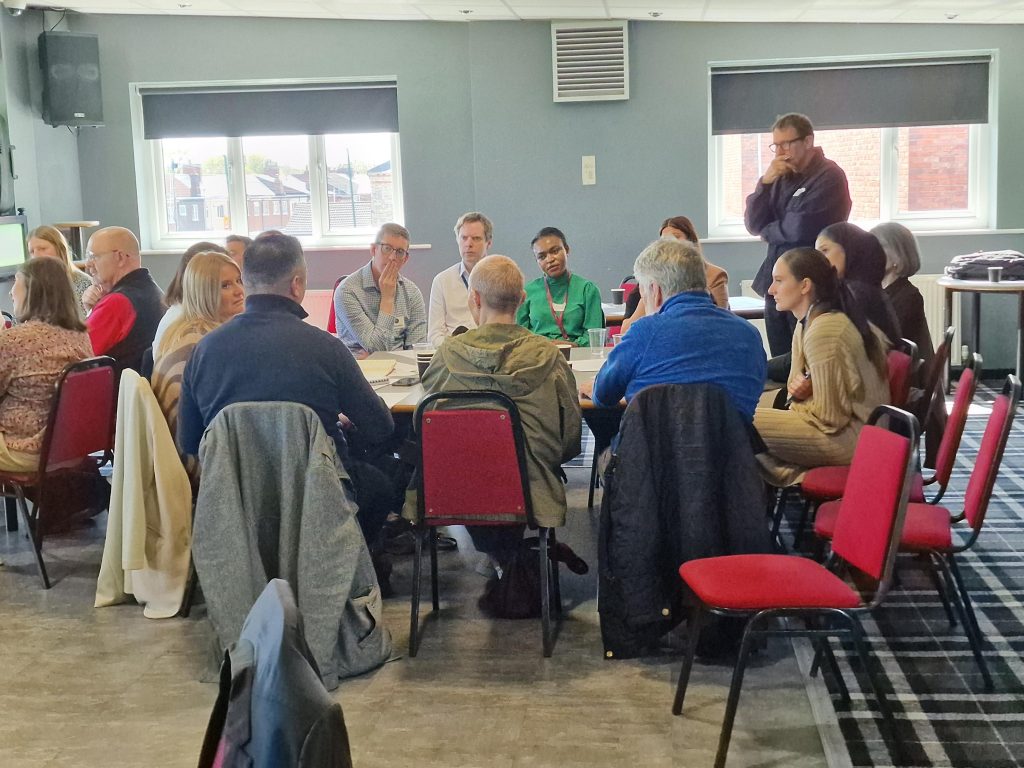Our fuel poverty forums bring likeminded people together

Grant Barron, Project Development Co-ordinator, explains how the fuel poverty forums, run by National Energy Action, are vital for all working in the fuel poverty arena.
Sitting around several tables in Chester-le-Street Cricket Club, at the last session of our fuel poverty forums for this month, 40 attendees shared their experiences of the energy crisis and what can be done. As the Chair of the North East forum, it’s always a pleasure to see so many engaged attendees share their insights, experiences and ideas to help householders live in warm, safe and healthy homes.
So far this year we’ve held 10 forums in every region in England and Wales, welcoming almost 400 attendees.
The North East forum took place on 30 April, at a time when despite energy bills dropping four weeks earlier, there was a consensus that the energy crisis was not over. We need to remain united to ensure that eye-wateringly high energy bills are not deemed the ‘new normal’.
Niamh Storey, our Policy and Research Officer, began by talking us through a cross-utility study that had been conducted regarding customers in vulnerable situations and community resilience. It was timely as we know that the energy crisis has further increased inequalities throughout society, where vulnerable householders will often pay more.
Our Head of Policy, Matt Copeland, gave an update on the many policy developments since we last met. These included Ofgem making the decision to make prepayment the cheapest payment type in the price cap – a campaign success for National Energy Action and our partners, at a time when forced installations of prepayment meters have restarted for several energy suppliers. National Energy Action is monitoring how this is being approached. Matt noted that standing charges are continuing to rise and are having a disproportionate impact on low-income households.
James Perry, Director at Egnida, walked our attendees through a tool that allows organisations to find out vital information within their communities. This includes a heat mapping function to find out where warm zones are located. This is available for all charity and third sector organisations to use for free. This can be extremely useful in identifying vulnerabilities and helping those most in need.
Our next speaker was Jacqui Osborne from Scope. Beginning with the stark statistic that 14 million people across the UK are disabled and that the average disabled household spends an additional £975 per month on energy costs. Jacqui told our forum attendees that WHAT service grew throughout Covid and the energy crisis, offering grants to customers on credit meters. Jacqui discussed Scope’s concerns about proposed reforms to Personal Independence Payments and the impact that this would have on disabled households. National Energy Action has worked closely with Scope to call for a social tariff for energy, giving discounted energy to vulnerable households including those with disabled people.
Our final speaker, Lauren Kennedy, Senior Policy Manager at Ofgem talked about the work that Ofgem has been doing on price protections, offering flexibility and the future of the price cap. Lauren said that despite the price cap falling on 1 April, millions were still struggling with the cost of debt built up over the energy crisis. Householders now owe over £3 billion to their suppliers, which is the highest level since records began.

We then broke into discussion groups to discuss two vital topics and gain insight and ideas from our expert attendees, who have a wealth of on-the-ground experience. Many staff had ideas on necessary next steps to tackle energy affordability and the higher level of debt within the energy sector. They discussed what steps were or weren’t being taken by energy companies to identify clients in, or at risk of, debt and what sort of support clients have been able to access to tackle energy debt. While discussing the records about debt, attendees talked about the sort of practices they were seeing in terms of how energy debt is being recovered, how it impacts their clients and different ways of doing this.
We also discussed the how we can ensure that private landlords upgrade their homes to a reasonable level of energy efficiency. This gave us an opportunity to understand what the local private rental sector looks like. There was a consensus that improving homes was critically important and we discussed the most effective mechanisms for incentivising private landlords to update homes to a higher energy efficiency standard and what sort of barriers need to be considered. These insights were incredibly useful in providing ideas around how our attendees were already effectively working with landlords in the area. We’ll write a report along with feedback from our other forums across England and Wales, which our policy team will use to lobby the current and incoming governments.
While our forums have been running for many years, it is only recently that we’ve been able to get back into communities following the height of the Covid pandemic. While virtual forums have allowed us to keep people talking about hugely important issues – our face-to-face forums offer the opportunity to make vital partnerships and an assurance that many of us are in it together to face the huge challenges ahead.
Thank you to everybody who came along to all the forums – whether that was in the North East or anyone else across the UK. We had a phenomenal turnout, and we can’t wait to see you at the next one.
Find out when our next forums will take place by signing up to our newsletter.

